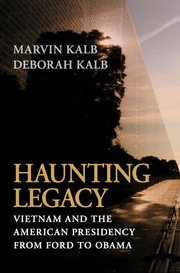Q&A with journalist Michael Putzel
 Wednesday, March 23, 2016 at 10:21PM
Wednesday, March 23, 2016 at 10:21PM  Michael Putzel is the author of the book The Price They Paid: Enduring Wounds of War. It focuses on the life of Jim Newman, a helicopter commander in the Vietnam War, and the impact of the war on him and those who served with him. Putzel covered the war for the Associated Press. His journalism career included serving as Washington bureau chief for The Boston Globe. He lives in Washington, D.C.
Michael Putzel is the author of the book The Price They Paid: Enduring Wounds of War. It focuses on the life of Jim Newman, a helicopter commander in the Vietnam War, and the impact of the war on him and those who served with him. Putzel covered the war for the Associated Press. His journalism career included serving as Washington bureau chief for The Boston Globe. He lives in Washington, D.C.
Q: Why did you decide to write about Jim Newman?
A: The decision really caught me by surprise. I had long thought about Newman as an incredible natural-born leader. After I covered Newman as a war correspondent, I was in Washington covering Watergate and other stories, I was in Moscow, I’d reflect back on Newman as a leader, an uncanny person, but not as a book prospect.
Only at his funeral did my interest in profiling him [for a story] turn into, I’ve got to answer some questions. I was asked to make remarks at the gravesite. We all were collecting in the administration building at Arlington. A guy approached me, and said, I know who you are, and not everybody is happy with the way the service is being conducted.
I was nonplussed. Newman was a certified war hero, and he certainly would have expected full military honors. What’s not to like about [the ceremony]?
I looked at the guy very quizzically, and he said, My name is Roger Newman, and I’m Major Newman’s eldest son…they won’t give me the flag.
I didn’t know Roger existed. He also has a younger brother born before the war. Newman was a legend—he would never leave anybody behind when he was in command. He came home from the war and left his wife and two boys behind when they were 15 and 17, and never spoke to them again.
It seemed an incredible contradiction to the man I had known. I had to find out what happened. In the course of that search, I talked to his first and second families, and then I started on the people I had known.
A dozen of his officers came to the funeral. They still worshipped him. I was asking the wrong questions: What was it about Newman? I began to get an inkling it wasn’t just Newman. They had their own problems. I began to ask the right questions.
One characteristic of combat veterans is they don’t talk about it. They know nobody would understand. Many of them told their stories to me for the first time.
Q: How much of Newman’s story is unique to him, and how much is it representative of others who served in combat in Vietnam?
A: It’s very hard to say. Certainly Newman as a leader was very unusual in my own personal experience. Of the people I knew in the field in Vietnam…he really was an unusual commander.
He didn’t look like a commander, he wasn’t an imposing physical presence, but he had a sense of how to make a decision in a hurry…how to keep [his people] going. He kept doing what he saw as his job…
His behavior after the war—I can’t really explain it. I can say what the family said, that Vietnam changed him. It was something about Vietnam.
Though he never as far as I know was evaluated for PTSD, he would never have applied for disability for PTSD--he had 100 percent disability for other things. He did get disability benefits, but never thought of applying as a victim of PTSD.
Q: Looking at the impact of PTSD, was he aware of the effect it had on him?
A: He certainly understood the impact it had on some of his people. He was sympathetic in that way. Even when he was dying of cancer, he found one of the pilots he had rescued—he was living in a one-room shack—[and tried to help him].
He was still devoted to these guys, and very proud of his service. He didn’t question that people had bad experiences after the war, but I don’t think he applied that to himself.
One of the book’s disappointments [is that] he had not told me about his first family. It’s one of the endless frustrations.
Q: How did you research the book, and how did his family react to it?
A: I was a reporter for almost 40 years. I started out the way I would report [a story]—what I know and didn’t know. When Roger approached me at the funeral, it didn’t take me very long to call him and ask to see him.
I spoke to him, his mother, his brother Ronald. I met members of Newman’s family, and interviewed the people around him. His stepson. His youngest son, born after the war, was very helpful. He worships his father. I went around interviewing these people, and then the people who flew for him. Stories began pouring out.
It turned out the people you never would have expected to have problems after the war—career military officers, dedicated soldiers, still waving the flag, proud of the duties they performed, at first it would never occur to me to ask them.
I’d ask a few questions: What are you doing now? Then I began to realize even guys who seemed so immune were anything but…My conclusion was that no one is immune.
Q: What did the family members think of the book?
A: Roger never saw the book, sadly, he was dying of complications from diabetes. His mother told me he was very near the end…FedEx lost the package [with the book I had sent him], and it arrived the day after he died. He was totally devoted to what I was doing.
Flora, Newman’s first wife, was hugely grateful for getting the story told, the true story…she and Ronald were hugely appreciative, and a number of other people.
Jay Newman, the youngest son, has not spoken to me [since the book came out]. We used to have regular visits—he would come visit his father’s grave, and I would go with him or meet him in Virginia. He was tremendously helpful during the process...
Q: In the book, you describe how, at his funeral, the mourners were divided in three groups. How did each group view him?
A: The group of former officers who flew for him still worshipped him and knew nothing of [his actions toward his family]…some knew he’d been divorced, but didn’t know the details. They were still grateful.
The first family had known him before the war, and some of his siblings, one who he’d broken all ties with, they knew Jimmy Newman, the one they’d grown up with, who lied to get into the Army at 16. They were the group who’d known him before.
The third group, Jay and the grandchildren, Jay’s family and some cousins and others—they basically knew him afterwards. They went off by themselves [at the funeral] as well.
Q: What do you see as Jim Newman’s legacy today?
A: Certainly he was a man who believed in duty, honor, his view of the military and what it was capable of was unquestioning loyalty to the Army and his country.
I think when you say, How did he leave things for the people who followed him, it’s hard to answer. The people in Army aviation, what’s remembered is the first part, the amazing leadership. They don’t deny what happened afterwards, but they celebrate what happened before.
One of the things that surprised me about the book—I thought the market for the book would be Vietnam veterans and families who understood. I believe that’s still a large market for the book, and the people in it and the people they know, but the market I did not know to explore was the military community itself, particularly retired leaders.
I’ve given several talks, in which three-star generals are coming up and saying they’d read this book and got to get it to this person or that person. They are tremendously receptive of the book because it tells the whole story. They are not denying it—they’re concerned about it too.
I viscerally expected more opposition, and I have not encountered it, I’m pleased to say.
Q: Are you working on another book?
A: I’ve been married more than 40 years. My wife [journalist Ann Blackman] wrote four biographies in less time than it took me to write this! I promised her there would be time for sailing when the book was done.
Last summer I started sailing with her [many] afternoons, and I will do more before I decide what’s next. She’s been enormously patient and helpful…
Q: Anything else we should know?
A: For me, the turning point was realizing I was writing the wrong book—a biography of Jim Newman—and realizing it was a bigger book…While in one sense, it was a mistake to not realize it earlier, it made it a more important book: [that’s] why it goes in other directions and deals with families and legacy.
Robert Howard’s story, and how [the war] affected his life—those are things that are just as important or more important than the extraordinary heroics people focus on…
People throw around a lot of statistics about the prevalence of PTSD among military people, but those numbers mean little because they include combatants, rear-echelon troops and all sorts of military experiences that vary widely, even among those sent to war.
The Price They Paid shows that in at least one unit that went through intense enemy fire and numerous losses of its own day after day, week after week, all those I found—and some who chose not to be found—were changed by the war in ways they never expected. For those warriors, the price for doing what their country asked of them is measured in lifetimes.
--Interview with Deborah Kalb. This Q&A can also be seen on deborahkalbbooks.blogspot.com.


Reader Comments